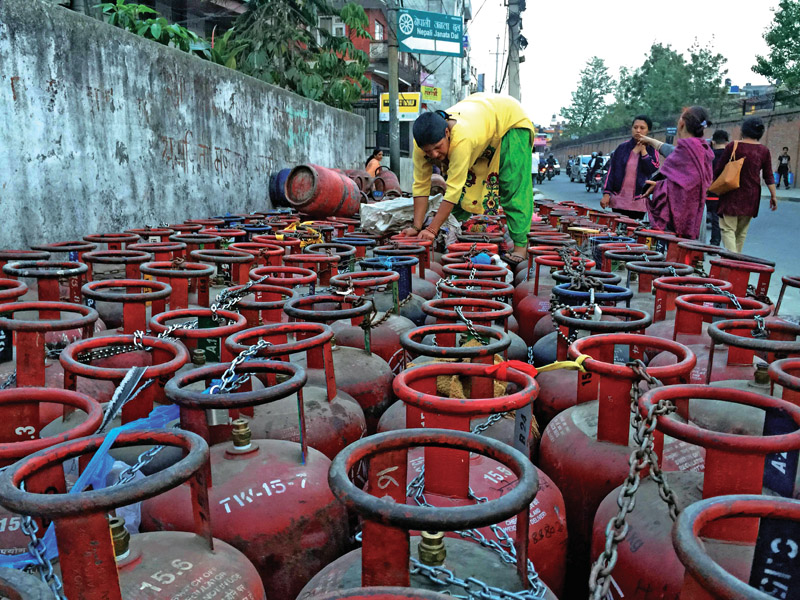Gas bottlers accused of prolonging LPG crisis
Kathmandu, April 6
Gas bottling plants have been accused of intentionally making supply of cooking fuel or liquefied petroleum gas (LPG) erratic to expand their market. Instead of refilling the cylinders that had already been circulated in the market, the bottling plants have reportedly dispatched around 1.5 million new cylinders. With this, the plants have prolonged the crisis on one hand, while expanded their market on the other.
Consumer rights activists and Gas Dealers’ Federation Nepal (GDFN) claim that the existing 55 bottling plants have been taking advantage of the dire situation and helplessness of the general public.
“Isn’t it strange that a significant number of new dealers have cropped up during the crisis to sell new cylinders?” questioned Chandra Bahadur Thapa, general secretary of GDFN.
Nepal Oil Corporation (NOC) Managing Director Gopal Bahadur Khadka has also said that the number of cylinders circulated in the market before the crisis was around six million. “But the recent data presented by the bottlers show that the number of cylinders circulated in the market is markedly higher,” he said at a programme organised by the Reporters’ Club here today.
GDFN claims there are around 7.5 million cylinders in circulation in the market at present. However, according to Shiva Prasad Ghimire, president of LP Gas Industry Association, the number of cylinders circulated in the market at present stands at around 6.7 million. Before the crisis, the number of cylinders stood at 6.5 million, he said.
“In the last five months, only around 200,000 additional cylinders were circulated in the market due to fresh demand from consumers,” said Ghimire, adding, “As the number of new hotels, restaurants as well as new household users has been increasing, it is only natural growth.”
Ghimire further said that the demand of cooking gas has been increasing at an
annual rate of 13 to 15
per cent.
According to GDFN, however, the bottling plants have also been breaching the law and directly dispatching cooking gas to big consumers like star hotels and industries, among others.
“The bottling plants have been supplying gas directly to big consumers, which helps them slash the dealers’ commission,” explained Thapa, further alleging that the bottlers have expanded their market base by getting their near and dear ones to open new depots and sell new cylinders.
Refuting the allegations of consumer rights activists and GDFN, Ghimire said that bottlers have been giving top priority to refill the cylinders collected from dealers. However, the prolonged crisis of cooking fuel despite adequate supply from Indian Oil Corporation does not support his assertion.
The monthly demand of cooking gas in the country is at around 29,000 tonnes. In March, the supply of cooking gas stood at 30,135 tonnes. Moreover, gas bottlers seem reluctant to increase the supply of cooking fuel from India. NOC had instructed bottlers to hire more bullets to increase the supply around two weeks back.
“However, the bottlers have not followed our instruction to take more bullets on lease and are instead demanding compensation for the detention and demurrage charges accrued during border blockade,” said Mukunda Prasad Ghimire, spokesperson of NOC.
It may also be noted that while purchasing new cylinders, consumers have to pay Rs 2,100 to Rs 2,400 as security deposit for the cylinder plus Rs 1,400 for the commodity.
“What’s worse is that the bottling plants have been mobilising the security deposit as working capital,” said Prem Lal Maharjan, president of National Consumer Forum. “The Office of Auditor General, in its recent report, had also raised red flag about misuse of the fund by the bottlers instead of establishing a security deposit fund.”
Meanwhile, the Ministry of Supplies (MoS) has said that it will commission an investigation on the prolonged crisis of cooking gas.
“The ministry has been flooded with complaints that bottling plants are prolonging the shortage by creating short-supply of refilled cylinders and instead circulating new cylinders to expand their market base,” said Uttam Nagila, joint secretary of the MoS. “We will look into the matter and take action against those found guilty.”
Nagila is the chair of the committee formed by Supply Minister Ganesh Man Pun to provide a way out for sustainable and smooth supply of cooking gas. The committee is reportedly planning to submit its report within the third week of April.






